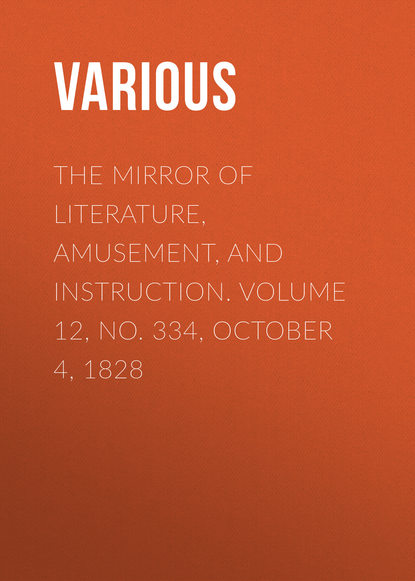По всем вопросам обращайтесь на: info@litportal.ru
(©) 2003-2024.
✖
The Mirror of Literature, Amusement, and Instruction. Volume 12, No. 334, October 4, 1828
Автор
Год написания книги
2018
Настройки чтения
Размер шрифта
Высота строк
Поля
The summer moon now sweetly shone
All softly and serene;
She clos'd the casement tremblingly
Upon the beauteous scene.
Above that carved mantle hung,
Clad in the garb of gloom,
A painting of rich feudal state,—
An old baronial room.
The Norman windows scarcely cast
A light upon the wall,
Where shone the shields of warrior knights
Within the lonely hall.
And, pendent from each rusty nail,
Helmet and steely dress,
With bright and gilded morion,
To grace that dim recess.
Then Mary thought upon each tale
Of terrible romance:—
The lady in the lonely tower—
The murd'rer's deadly glance—
And moon-lit groves in pathless woods,
Where shadows nightly sped;
Her fancy could not leave the realms
Of darkness and the dead.
There stood a messenger without,
Beside her master's gate,
Who, till his thirsty horse had drunk,
Would hardly deign to wait.
The mansion rung with Mary's name,
For dreadful news he bore—
A dying mother wish'd to look
Upon her child once more.
The words were, "Haste, ere life be gone;"
Then was she quickly plac'd
Behind him on the hurrying steed,
Which soon the woods retrac'd.
Now they have pass'd o'er Morton Bridge,
While smil'd the moon above
Upon the ruffian and his prey—
The hawk and harmless dove.
The towering elms divide their tops;
And now a dismal heath
Proclaims her "final doom" is near
The awful hour of death!
The villain check'd his weary horse,
And spoke of trust betray'd;
And Mary's heart grew sick with fright,
As, answering, thus she said—
"Oh! kill me not until I see
My mother's face again!
Ride on, in mercy, horseman, ride,
And let us reach the lane!
"There slay me by my mother's door,
And I will pray for thee—
For she shall find her daughter's corse"—
"No, girl, it cannot be.
"This heath thou shalt not cross, for soon
Its earth will hide thy form;
That babbling tongue of thine shall make
A morsel for the worm!"
She leap'd upon the ling-clad heath,
And, nerv'd with phrensied fear,
Pursued her slippery way across,
Until the wood was near.
But nearer still two fiends appear'd,
Like hunters of the fawn,
Who cast their cumb'ring cloaks away,
Beside that forest lone;
And bounded swifter than the maid,
Who nearly 'scap'd their wrath,
For well she knew that woody glade,
And every hoary path,
Obscur'd by oak and hazel bush,
Where milk-maid's merry song
Had often charm'd her lover's ear,
Who blest her silv'ry tongue.
But Mary miss'd the woodland stile—
The hedge-row was not high;
She gain'd its prickly top, and now
Her murderers were nigh.











